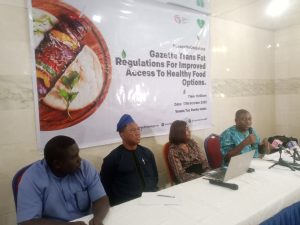
By Deji Abdulwahab
Some Non-Governmental Organisations have called on the Federal Government to finalise the process of gazette of the ‘Fats and Oils Regulation, 2021’ to safeguard the health of Nigerians.
The Corporate Accountability and Public Participation Africa (CAPPA), Network for Health Equity and Development (NHED), Global Health Advocacy Incubator (GHAI) and Trans Fat Free Nigeria coalition gave the advice on Monday at a news conference in Abuja.
The news conference, in commemoration of the 2022 World Food Day is globally celebrated every Oct. 16 in line with the founding of Food and Agriculture Organisation (FAO).
The day is aimed at promoting healthy diets and eradicating hunger issues by 2030 in line with the Sustainable Development Goals (SDGs)
The Executive Director of CAPPA, Mr Akinbode Oluwafemi, said that the theme of the event “Leave No One Behind’’ was apt and imperative to the passage and implementation of the Fats and Oils Regulation.
Oluwafemi said the NGOs used the opportunity to call on the government to immediately finalise the process of gazette of the ‘Fats and Oils Regulation, 2021’ for the benefit of the Nigerian public.
“This responsibility lies on the Federal Ministry of Justice which has now received the regulations.
“The mandatory regulation which will come into force upon the gazetting of the regulation, along with other instruments, will expand the access of Nigerians, regardless of their social status to healthy food.’’
According to him, the regulation will also impact greatly on the health cost incurred by individuals who would have been exposed to unhealthy food and its debilitating impacts.
In his remarks, Dr Jerome Mafeni, Project Adviser for Trans fats Elimination, NHED said that improving access to safe and nutritious food is important especially for poor and vulnerable communities.
According to Mafeni, this is imperative to vulnerable who are hit hardest by the harmful effects unhealthy foods have on consumers.
“This is more so as several of these can be prevented through the improvement in public awareness and appropriate regulations.
“Trans fats have been linked to increases in the risk of heart disease, diabetes, obesity, cancers, dementia and death.
“According to estimates by the World Health Organisation (WHO), over 500, 000 persons died yearly resulting from complications associated with the consumption of foods high in trans fats.
“This statistic has led to the call for the global elimination of industrially produced trans-fat by 2023,’’ he said.
The Nigeria Food and Nutrition Coordinator of GHAI, Joy Amafah, urged the Federal Government to hasten the passage of the regulation to limit the consumption of trans fatty acids from the Nigeria food supply chain.
According to Amafah, this will help cater to the needs of the population regardless of social class or status and encourage access to healthy food options for all.
She added that it would also safeguard Nigerians and reduce the inflow of trans-fatty foods in the market.
“Additionally, this step would potentially place Nigeria on the global front as the 2nd African country to enact best practices to eliminate industrially produced trans fatty acids according to the WHO Replace Action Framework.
“Therefore, making Nigeria an example to other countries in the region that this is indeed possible.
“Good food starts with a good product, safe and healthy products are critical guarantors of good health for the Nigerian people but mandatory standards not voluntary will get you there.
“Food safety is a shared responsibility with a role for everyone to play,’’ she said.(NAN)



